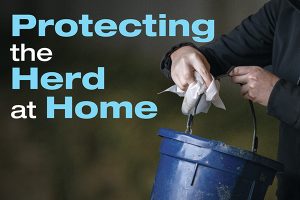Protecting The Herd At Home
Click here to read the complete article
338 – May/June, 2024
Not since a certain event that happened four years ago has there ever been so many notifications about viruses popping up across the country. Only, this time we’re not talking about humans, we’re talking about horses.
According to the Equine Disease Communications Center (EDCC), there have been 98 cases reported of multiple communicable diseases, including strangles, vesicular stomatitis, Equine Infectious Anemia (EIA) and equine herpesvirus (neurologic and respiratory) since January 1 to mid-March in the United States and Canada. These affected 21 states and Canadian provinces including Florida, Texas, California, Ohio and Tennessee.
A disease outbreak can happen anywhere–at a private facility or at a large two-week long show circuit. However, it’s typically because of what happens while on the road that causes the disease at home.
Prepare Before You Go
The best way to battle disease is prevention, so preparing your barn and your herd to battle impending infection is key to avoiding any disaster.
Schedule a check by your veterinarian a minimum of two weeks prior to hitting the road to obtain a statement of health. (Note: the World Equestrian Center in Ohio and Florida requires a statement of health dated within 14 days of check-in.) Your veterinarian will check your horse’s temperature, ask for a history of travel in the past weeks and make sure your horse is up to date on any routine health care and vaccinations. After the veterinary check, take temperatures of all horses twice daily and maintain a log for each horse to help you keep records prior to hitting the road.
Your veterinarian should vaccinate your horses as instructed by the American Association of Equine Practitioners’ Vaccination Guidelines.
These guidelines outline the four core vaccinations:
Click here to read the complete article
338 – May/June, 2024











